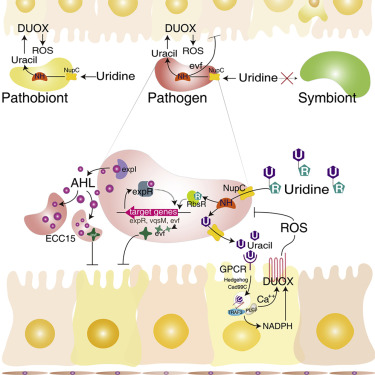当前位置:
X-MOL 学术
›
Cell Host Microbe
›
论文详情
Our official English website, www.x-mol.net, welcomes your feedback! (Note: you will need to create a separate account there.)
Bacterial Nucleoside Catabolism Controls Quorum Sensing and Commensal-to-Pathogen Transition in the Drosophila Gut.
Cell Host & Microbe ( IF 30.3 ) Pub Date : 2020-02-12 , DOI: 10.1016/j.chom.2020.01.025 Eun-Kyoung Kim 1 , Kyung-Ah Lee 2 , Do Young Hyeon 3 , Minsoo Kyung 3 , Kyu-Yeon Jun 4 , Seung Hee Seo 4 , Daehee Hwang 3 , Youngjoo Kwon 4 , Won-Jae Lee 2
Cell Host & Microbe ( IF 30.3 ) Pub Date : 2020-02-12 , DOI: 10.1016/j.chom.2020.01.025 Eun-Kyoung Kim 1 , Kyung-Ah Lee 2 , Do Young Hyeon 3 , Minsoo Kyung 3 , Kyu-Yeon Jun 4 , Seung Hee Seo 4 , Daehee Hwang 3 , Youngjoo Kwon 4 , Won-Jae Lee 2
Affiliation

|
Although the gut microbiome is generally symbiotic or commensal, some microbiome members become pathogenic under certain circumstances. However, the factors driving this pathogenic switch are largely unknown. Pathogenic bacteria can generate uracil that triggers host dual oxidase (DUOX) to produce antimicrobial reactive oxygen species (ROS). We show that pathogens generate uracil and ribose upon nucleoside catabolism of gut luminal uridine, which triggers not only host defenses but also inter-bacterial communication and pathogenesis in Drosophila. Uridine-derived uracil triggers DUOX-dependent ROS generation, whereas ribose induces bacterial quorum sensing (QS) and virulence gene expression. Genes implicated in nucleotide metabolism are found in pathogens but not commensal bacteria, and their genetic ablation blocks QS and the commensal-to-pathogen transition in vivo. Furthermore, commensal bacteria lack functional nucleoside catabolism, which is required to achieve gut-microbe symbiosis, but can become pathogenic by enabling nucleotide catabolism. These findings reveal molecular mechanisms governing the commensal-to-pathogen transition in different contexts of host-microbe interactions.
中文翻译:

细菌核苷代谢控制果蝇肠道中的群体感应和共生-致病菌过渡。
尽管肠道微生物组通常是共生的或共生的,但某些微生物组成员在某些情况下会致病。但是,导致这种致病性转变的因素在很大程度上尚不清楚。致病细菌可产生尿嘧啶,触发宿主双重氧化酶(DUOX)产生抗微生物活性氧(ROS)。我们显示病原体产生的肠腔尿苷核苷分解代谢上的尿嘧啶和核糖,不仅触发宿主防御,而且还引起果蝇细菌间的交流和发病机理。尿苷衍生的尿嘧啶触发DUOX依赖的ROS生成,而核糖诱导细菌群体感应(QS)和毒力基因表达。在病原体中发现了与核苷酸代谢有关的基因,而在共生细菌中却没有,并且它们的遗传消融作用在体内阻碍了QS和共生-病原体的转化。此外,共生细菌缺乏功能性的核苷分解代谢,这是实现肠道微生物共生所必需的,但是可以通过使核苷酸分解代谢而成为致病性。这些发现揭示了在宿主-微生物相互作用的不同情况下控制共生-病原体转变的分子机制。
更新日期:2020-02-20
中文翻译:

细菌核苷代谢控制果蝇肠道中的群体感应和共生-致病菌过渡。
尽管肠道微生物组通常是共生的或共生的,但某些微生物组成员在某些情况下会致病。但是,导致这种致病性转变的因素在很大程度上尚不清楚。致病细菌可产生尿嘧啶,触发宿主双重氧化酶(DUOX)产生抗微生物活性氧(ROS)。我们显示病原体产生的肠腔尿苷核苷分解代谢上的尿嘧啶和核糖,不仅触发宿主防御,而且还引起果蝇细菌间的交流和发病机理。尿苷衍生的尿嘧啶触发DUOX依赖的ROS生成,而核糖诱导细菌群体感应(QS)和毒力基因表达。在病原体中发现了与核苷酸代谢有关的基因,而在共生细菌中却没有,并且它们的遗传消融作用在体内阻碍了QS和共生-病原体的转化。此外,共生细菌缺乏功能性的核苷分解代谢,这是实现肠道微生物共生所必需的,但是可以通过使核苷酸分解代谢而成为致病性。这些发现揭示了在宿主-微生物相互作用的不同情况下控制共生-病原体转变的分子机制。


























 京公网安备 11010802027423号
京公网安备 11010802027423号